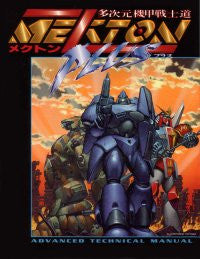 R. Talsorian Games published Mekton back in the '80s because "Maximum" Mike Pondsmith is a serious anime fan who loves his giant robots. While BattleTech had its following, it was never an anime-style game; Palladium Books had (and has) the Robotech license, but that too didn't really have the feel of the source material, and the same is true of the times that HERO Games hit on the matter for Champions.
R. Talsorian Games published Mekton back in the '80s because "Maximum" Mike Pondsmith is a serious anime fan who loves his giant robots. While BattleTech had its following, it was never an anime-style game; Palladium Books had (and has) the Robotech license, but that too didn't really have the feel of the source material, and the same is true of the times that HERO Games hit on the matter for Champions.
Mekton was the first tabletop RPG that attempted to nail that feel, summarized thusly: "Action! Romance! GIANT ROBOT COMBAT!. I came on board with Mekton II, but it was the final published edition--Mekton Zeta--was when everything finally looked to come together and much of the game's potential for anime-flavored fun to be realized.
Sure, I concur that (as written) the game heavily favored a gameplay experience akin to Mobile Suit Gundam, Super-Dimensional Fortress Macross, Dairugger 15, Beast King Go-Lion, and the many superheroic robot shows (e.g. Giant Robo) of old but you really could do anything if you had the one key supplement for the line: Mekton Zeta Plus.
The trick is to realize that the advanced mecha build system was really just a weighted point-buy system, through which you could easily make actual human-sized PCs if you liked. You could even do Record of Lodoss War, with effects as spells, items, or creatures. It wasn't hard, but I found many lacking that sort of vision. More's the pity, but it's understandable: most people will NOT work for their entertainment.
 The problem that befell Mekton Zeta was that the company went into internal turmoil just as the tabletop RPG marketplace and subculture went into a turnover prior to a collapse. Many of the supplements in this product line did not find their mark, and the crossovers (e.g. Starblade Battalion, building off Cyberpunk 2020) did not find favor with the established audience.
The problem that befell Mekton Zeta was that the company went into internal turmoil just as the tabletop RPG marketplace and subculture went into a turnover prior to a collapse. Many of the supplements in this product line did not find their mark, and the crossovers (e.g. Starblade Battalion, building off Cyberpunk 2020) did not find favor with the established audience.
In the end, as with the rest of the company (and the rest of the field wherein R. Talsorian rested), it fell away from awareness--it was, in no way, shape, or form a viable Dungeons & Dragons competitor--because the videogame media took off like a rocket and provided (for most of us into anime-styled RPGs) a superior alternative that reliably delivered. The potential got lost, and now R. Talsorian exists as a shell to maintain the extant intellectual property and nothing more (especially after the risible third edition of Cyberpunk).
That doesn't mean that the game's a lost cause as such. Rather, with a recognition of today's economic realities (and the much-changed state of anime fandom today in the West), there is a place for a game like Mekton- but it has to, at last, deliver on the potential wasted over 20 years ago by a combination of fan stupidity, publisher stupidity, and the tabletop RPGs marketplace.
No comments:
Post a Comment
Anonymous comments are banned. Pick a name, and "Unknown" (et. al.) doesn't count.